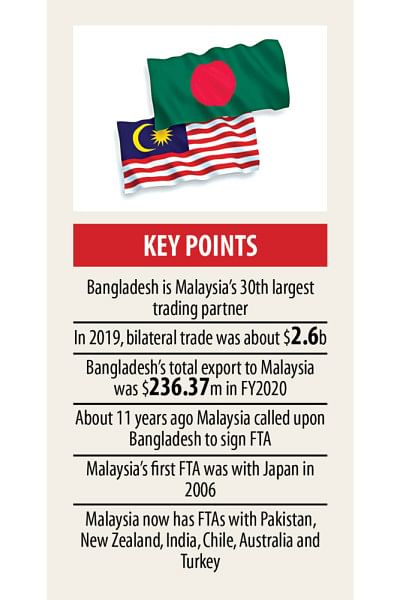FTA with Malaysia back on the table

Bangladesh's signing of a free trade agreement (FTA) with Malaysia should not be just for the duty free benefits on export but also for securing massive investments, according to economists.
Bangladesh should also focus on making use of low-cost industrial materials that can be imported from Malaysia aside from collecting revenue from import duties to promote domestic and export markets, said Khondaker Golam Moazzem, research director of the Centre for Policy Dialogue (CPD).
Besides, the FTA's signing should aim to develop into a comprehensive economic partnership agreement (Cepa), he said.
Moazzem was addressing a webinar on "Bangladesh-Malaysia FTA: Challenges & Opportunities for Business Community" organised by the Bangladesh-Malaysia Chamber of Commerce and Industry (BMCCI).
Commerce Minister Tipu Munshi, diplomats, exporters and importers from both countries attended the event.
Malaysian High Commissioner to Bangladesh Haznah Md Hashim said if signing FTAs were a mistake, the country would not have repeated it and so it has penned 16 since 1993.
The latest agreement was signed amidst the ongoing coronavirus pandemic properly documenting the benefits, she said. In 2020, Malaysia's trade with all its FTA partners stood at 1.185 trillion Malaysian Ringgits, or 66.7 per cent of its total trade, she added.
Of its total trade for the year, Malaysia's exports to its FTA partners was valued at 667.46 billion Malaysian Ringgits, or 68 per cent of the total exports, which mainly consist of electronic components, petroleum and chemical products that account for 53.2 per cent of its exports to FTA markets.
Bangladesh is Malaysia's 30th largest trading partner and second in overall among South Asian nations. Bangladesh is also Malaysia's 20th largest export destination, signifying the country's growing importance as an economy.
In 2019, trade between Malaysia and Bangladesh was recorded at around $2.6 billion, up from $2.4 billion the previous year. For the period between January and July 2020, trade has lessened but remains robust despite the ongoing pandemic, Hashim said.
In fiscal 2019-20, Bangladesh's total export to Malaysia was $236.37 million, according to data from the Export Promotion Bureau.
As for the proposed FTA, it has been on the table for 11 years and therefore, it is about time for Bangladesh to revisit the process given its status as one of the fastest growing economies in the world today.
Besides, its impending graduation from the group of least developed countries also makes it crucial to secure such deals.
"I wish to begin by reiterating that as an open economy, Malaysia is a firm believer of not only free, but also fair trade policies," she added.
Hashim went on to say that since the conclusion of its first FTA with Japan 15 years ago, Malaysia has implemented FTAs with six other nations, namely Pakistan, New Zealand, India, Chile, Australia and Turkey.
The country has also implemented seven regional FTAs since 1993, namely the ASEAN Free Trade Area (AFTA), ASEAN-China, ASEAN-Korea, ASEAN-Japan, ASEAN-Australia- New Zealand, ASEAN-India and ASEAN-Hong Kong.
There are two other multilateral FTAs which have been signed but are pending ratification, namely a Comprehensive and Progressive Agreement for Trans-Pacific Partnership (CPTPP) and most recently a Regional Comprehensive Economic Partnership (RCEP), Hashim said.
Former BMCCI president Syed Moazzam Hossain said the discussion on an FTA with Malaysia was yet to make progress even though the initiative was taken in 2010 because the National Board of Revenue (NBR) opined that the government would lose out on import duties.
"I guarantee that I will go for this FTA," said Munshi, adding that signing of FTAs was needed to increase trade ahead of the United Nations status graduation.
Although Bangladesh has been lobbying many developing and developed countries over the last three decades to sign FTAs, no such deal has yet been signed other than a preferential trade agreement (PTA) with Bhutan in December last year.
BMCCI President Raquib Mohammad Fakhrul moderated the discussion where a member of the Bangladesh Trade & Tariff Commission, Mostafa Abid Khan, presented the keynote paper.

 For all latest news, follow The Daily Star's Google News channel.
For all latest news, follow The Daily Star's Google News channel. 



Comments